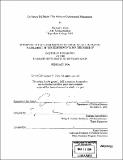Do parties still matter? : the politics of gubernatorial nominations
Author(s)
Cobb, Rachael V
DownloadFull printable version (10.62Mb)
Alternative title
Politics of gubernatorial nominations
Other Contributors
Massachusetts Institute of Technology. Dept. of Political Science.
Advisor
Stephen Ansolabehere.
Terms of use
Metadata
Show full item recordAbstract
Who controls the nomination in gubernatorial elections? This dissertation seeks to answer this simple question. Parties have classically been the organizations held responsible for throwing their collective effort behind a candidate and controlling the nominations. Yet, in recent years, scholars have noted a steady weakening of American political parties through a succession of major alterations in the political landscape: the loss of patronage-based organizations traditionally used to uphold party organizations; competition from interest groups; and the ascendancy of media-based campaigns and political consultants which buoy candidates' personal organizations. Not only that, recent work suggests that national party organizations have displaced their state-level counterparts. The combined result of these strains on the party system, scholars conclude, is the rise of a candidate-centered politics and of an electoral politics that can no longer count parties as critical factors in the political system. My dissertation tests whether parties have been dealt out of the nominations process in gubernatorial primary elections in six states: Colorado, Illinois, Ohio, Massachusetts, New Mexico, and Texas. My principal evidence is elite public endorsements of candidates. I find that the tempo, quantity, and quality of endorsement activity varies from election to election according to many factors. My research finds that endorsement activity fluctuates within four principal domains - across election type (general or primary), across the level of competition in a given election, across party, and across states. Contrary to many recent studies, I do not find evidence of an "extended party" - of a broad set of actors (interest groups and highly-partisan influential elites) (cont.) that help in the nominee selection process in four of my six case studies. Instead, I find many states with strong parties that expressly do not have large numbers of important groups and individuals involved. Moreover, in states in which major groups and influential individuals are involved to a high degree, I find evidence of weak, factionalized parties.
Description
Thesis (Ph. D.)--Massachusetts Institute of Technology, Dept. of Political Science, 2006. "February 2006." Includes bibliographical references (p. 143-150).
Date issued
2006Department
Massachusetts Institute of Technology. Department of Political SciencePublisher
Massachusetts Institute of Technology
Keywords
Political Science.